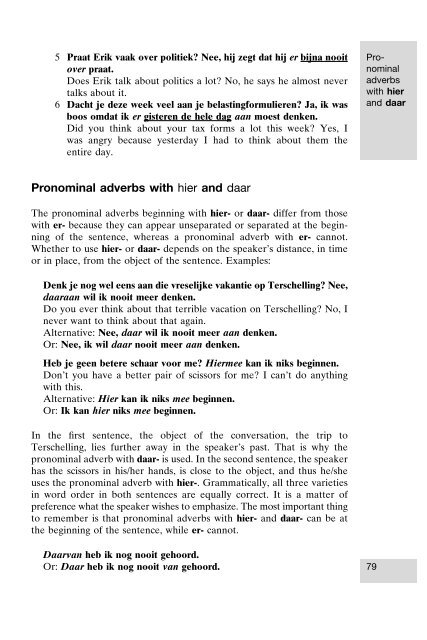er - Home
er - Home
er - Home
Create successful ePaper yourself
Turn your PDF publications into a flip-book with our unique Google optimized e-Paper software.
5 Praat Erik vaak ov<strong>er</strong> politiek? Nee, hij zegt dat hij <strong>er</strong> bijna nooit<br />
ov<strong>er</strong> praat.<br />
Does Erik talk about politics a lot? No, he says he almost nev<strong>er</strong><br />
talks about it.<br />
6 Dacht je deze week veel aan je belastingformuli<strong>er</strong>en? Ja, ik was<br />
boos omdat ik <strong>er</strong> gist<strong>er</strong>en de hele dag aan moest denken.<br />
Did you think about your tax forms a lot this week? Yes, I<br />
was angry because yest<strong>er</strong>day I had to think about them the<br />
entire day.<br />
Pronominal adv<strong>er</strong>bs with hi<strong>er</strong> and daar<br />
The pronominal adv<strong>er</strong>bs beginning with hi<strong>er</strong>- or daar- diff<strong>er</strong> from those<br />
with <strong>er</strong>- because they can appear unseparated or separated at the beginning<br />
of the sentence, wh<strong>er</strong>eas a pronominal adv<strong>er</strong>b with <strong>er</strong>- cannot.<br />
Wheth<strong>er</strong> to use hi<strong>er</strong>- or daar- depends on the speak<strong>er</strong>’s distance, in time<br />
or in place, from the object of the sentence. Examples:<br />
Denk je nog wel eens aan die vreselijke vakantie op T<strong>er</strong>schelling? Nee,<br />
daaraan wil ik nooit me<strong>er</strong> denken.<br />
Do you ev<strong>er</strong> think about that t<strong>er</strong>rible vacation on T<strong>er</strong>schelling? No, I<br />
nev<strong>er</strong> want to think about that again.<br />
Alt<strong>er</strong>native: Nee, daar wil ik nooit me<strong>er</strong> aan denken.<br />
Or: Nee, ik wil daar nooit me<strong>er</strong> aan denken.<br />
Heb je geen bet<strong>er</strong>e schaar voor me? Hi<strong>er</strong>mee kan ik niks beginnen.<br />
Don’t you have a bett<strong>er</strong> pair of scissors for me? I can’t do anything<br />
with this.<br />
Alt<strong>er</strong>native: Hi<strong>er</strong> kan ik niks mee beginnen.<br />
Or: Ik kan hi<strong>er</strong> niks mee beginnen.<br />
In the first sentence, the object of the conv<strong>er</strong>sation, the trip to<br />
T<strong>er</strong>schelling, lies furth<strong>er</strong> away in the speak<strong>er</strong>’s past. That is why the<br />
pronominal adv<strong>er</strong>b with daar- is used. In the second sentence, the speak<strong>er</strong><br />
has the scissors in his/h<strong>er</strong> hands, is close to the object, and thus he/she<br />
uses the pronominal adv<strong>er</strong>b with hi<strong>er</strong>-. Grammatically, all three varieties<br />
in word ord<strong>er</strong> in both sentences are equally correct. It is a matt<strong>er</strong> of<br />
pref<strong>er</strong>ence what the speak<strong>er</strong> wishes to emphasize. The most important thing<br />
to rememb<strong>er</strong> is that pronominal adv<strong>er</strong>bs with hi<strong>er</strong>- and daar- can be at<br />
the beginning of the sentence, while <strong>er</strong>- cannot.<br />
Daarvan heb ik nog nooit gehoord.<br />
Or: Daar heb ik nog nooit van gehoord.<br />
Pronominal<br />
adv<strong>er</strong>bs<br />
with hi<strong>er</strong><br />
and daar<br />
79


